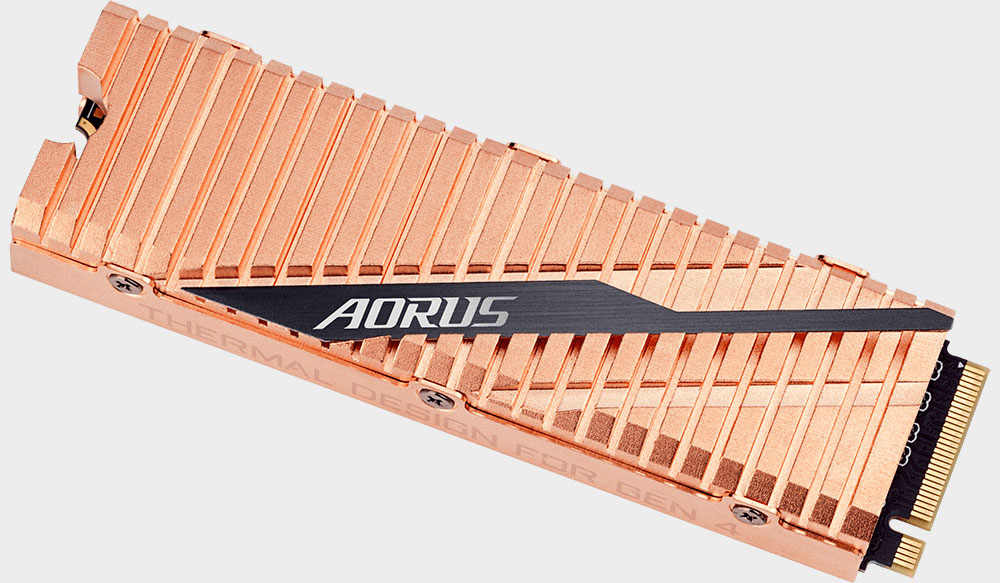Gigabyte’s next-gen PCIe 4.0 SSDs go up for preorder starting at $259
These Aorus drives add to the growing pile of PCIe 4.0 storage options.

Little by little, next-gen PCI Express 4.0 solid state drives are landing on store shelves to attempt to seize the best NVMe SSD crown, in preparation for retail availability of AMD's third-generation Ryzen processors and accompanying X570 motherboards. The latest to enter the retail fray is Gigabyte's Aorus family of high-speed SSDs.
The fancy new Aorus M.2 NVMe SSDs follow what is becoming a familiar script—1TB and 2TB capacities, both of which can tap into the PCIe 4.0 bus to deliver sequential read and write speeds of up to 5,000MB/s and 4,000MB/s, respectively.
These drives join Corsair and Sabrent in being the first PCIe 4.0 models that are available to purchase, albeit in preorder form (the new drives release on July 8).
Here are the current options, starting with Gigabyte's new models:
- Gigabyte Aorus 2TB PCIe 4.0 SSD (GP-ASM2NE6200TTTD)—$479.99, Newegg
- Gigabyte Aorus 1TB PCie 4.0 SSD (GP-ASM2NE6100TTTD)—$259.99, Newegg
- Corsair Force Series MP600 2TB PCIe 4.0 SSD—$449.99, Amazon
- Corsair Force Series MP600 1TB PCIe 4.0 SSD—$249.99, Amazon
- Sabrent Rocket 2TB PCIe 4.0 SSD (w/ heatsink)—$449.99, Amazon
- Sabrent Rocket 2TB PCIe 4.0 SSD (no heatsink)—$429.99, Amazon
- Sabrent Rocket 1TB PCIe 4.0 SSD (w/ heatsink)—$249.99, Amazon
- Sabrent Rocket 1TB PCIe 4.0 SSD (no heatsink)—$229.99, Amazon
Only Sabrent is offering a version of its next-gen SSDs without a heatsink, for a slightly cheaper price tag. However, the company notes that a "heatsink is required" to run at full bore, otherwise thermal throttling is going to kick in really fast.
The rated sequential read and write specs are similar across the board, though not identical. Here's how it breaks down:
- Gigabyte Aorus PCIe 4.0 SSD—5,000MB/s read, 4,000MB/s write
- Corsair Force Series PCIe 4.0 SSD—4,950MB/s read, 4,250MB/s write
- Sabrent Rocket PCIe 4.0 SSD—5,000MB/s read, 4,400MB/s write
We have not had an opportunity to test any of these drives. When we do, it will be interesting to see which ones can actually hit those top speeds, and just as important, how long each one can maintain that level of performance.
Keep up to date with the most important stories and the best deals, as picked by the PC Gamer team.
Note that all of these drives will require a PCIe 4.0 platform to operate at full speed. So far, only upcoming X570 motherboards for AMD's third-generation Ryzen family support PCIe 4.0. It is technically possible to add PCIe 4.0 support to some older generation motherboards (such as X470), but because it's on a case-by-case basis, AMD has opted to block support on all pre-X570 motherboards.
That said, you could plug any of these PCIe 4.0 SSDs into an existing motherboard so long as it has an NVMe port. They just won't run as fast.
All that said, the best SSD for gaming can still be a SATA-based drive. Even though SATA SSDs top out at around 550-580MB/s, that is still plenty fast for gaming, as well as general purpose computing chores.
Paul has been playing PC games and raking his knuckles on computer hardware since the Commodore 64. He does not have any tattoos, but thinks it would be cool to get one that reads LOAD"*",8,1. In his off time, he rides motorcycles and wrestles alligators (only one of those is true).


